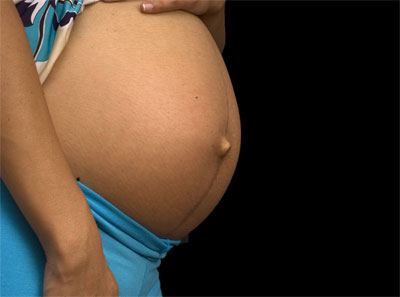Lower Abdominal Pain During Pregnancy
Abdominal pain during pregnancy is always frightening to women. That’s why pregnant women should continuously consult their obstetrician or gynecologist who could identify the causes of abdominal pain and take action to eliminate it if necessary.

Types of Lower Abdominal Pain during Pregnancy
Lower abdominal pain can be of two major types: obstetrical pain and non-obstetrical pain. The first type includes pains caused by ectopic pregnancy, premature placental abruption or a possible miscarriage. The second type includes pain related to digestive system, round ligament strain, tired abdominal muscles or surgical disorders such as appendicitis.
Lower Abdominal Pain Caused by Ectopic Pregnancy
Ectopic pregnancy is a condition when fertilized egg attaches outside the uterus and to a fallopian tube. Ectopic pregnancy is diagnosed by ultrasound scan. But if you didn’t do your ultrasound scan and your pregnancy test is positive, sudden bouts of abdominal pain and dizziness may be alarming. These symptoms occur when the egg tears at the fallopian tube as it grows, causing pain and bleeding. It may happen between the fifth and the seventh week of pregnancy. If you have any of these symptoms, call paramedics immediately as you may need surgery on this.
Abdominal Pain Due to Pending Miscarriage
If this is the case, you will experience gnawing pain in your abdomen that may transfer to your lower back. Another symptom is bloody vaginal discharge of different intensity. The woman with symptoms of miscarriage should be admitted to hospital as soon as possible. At the hospital, she will have examinations of her hormonal profile, fetus condition and infections that can cause pregnancy complications. Then, the pregnant woman will be ordered the treatment she needs. In some cases, you will need to stay at hospital for a long time to maintain your pregnancy.
Lower Abdominal Pain Caused by Premature Placental Abruption
Lower abdominal pain can occur due to premature placental abruption (during pregnancy or labor). Premature placental abruption is the separation of placenta from the wall of uterus during pregnancy. Premature placental abruption can be triggered by abdomen injury, physical fatigue and medical conditions such as hypertensive heart disease or toxicosis of the second half of pregnancy. This results in torn blood vessels accompanied by severe lower abdominal pain and bleeding into the uterus, which may lead to complications in mother and fetus. If you have any of these symptoms, call paramedics right away because you will need an emergency delivery and the arrest of bleeding.
Abdominal Pain Caused by Digestive System
Digestive organs lie near your growing uterus that puts a pressure on them. Obviously, they will respond on the pressure. Fluctuations in hormone levels may be negative, too, because they make women change their diet. Pregnant women sometimes eat foods that can cause different digestive disorders. Spicy and sour meal can cause stomach irritation. Sweet food can lead to the fermentation in stomach and dysbacteriosis. Dysbacteriosis, in its turn, results in swelling and stomach ache. The treatment in this case includes maintaining healthy diet and taking drugs prescribed by your doctor.
Lower Abdominal Pain Due to Muscle and Ligament Strain
During pregnancy, your growing uterus stretches the ligaments that support it. This can cause occasional bouts of pain in lower abdomen that increase in intensity as you lift heavy objects, make fast moves or cough. You may also experience pains due to the overstrain of abdominal muscles.
You don’t need any special treatment here, just take a good rest. What makes these pains dangerous is they worry pregnant women, causing stress. So it is crucial to consult your doctor who can identify the causes and ease all fears as well as promptly prescribe a proper treatment to avoid complications.
Abdominal Pain Due To Surgical Disorders
As with any person, pregnant woman may have appendicitis, severe cholecystitis and other conditions. If that’s the case, only surgery can help.
If you have abdominal pain, consult your doctor immediately or call paramedics to ensure everything is going to be all right.
Source of the image: sxc.hu/profile/memoossa.
